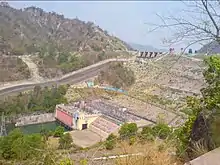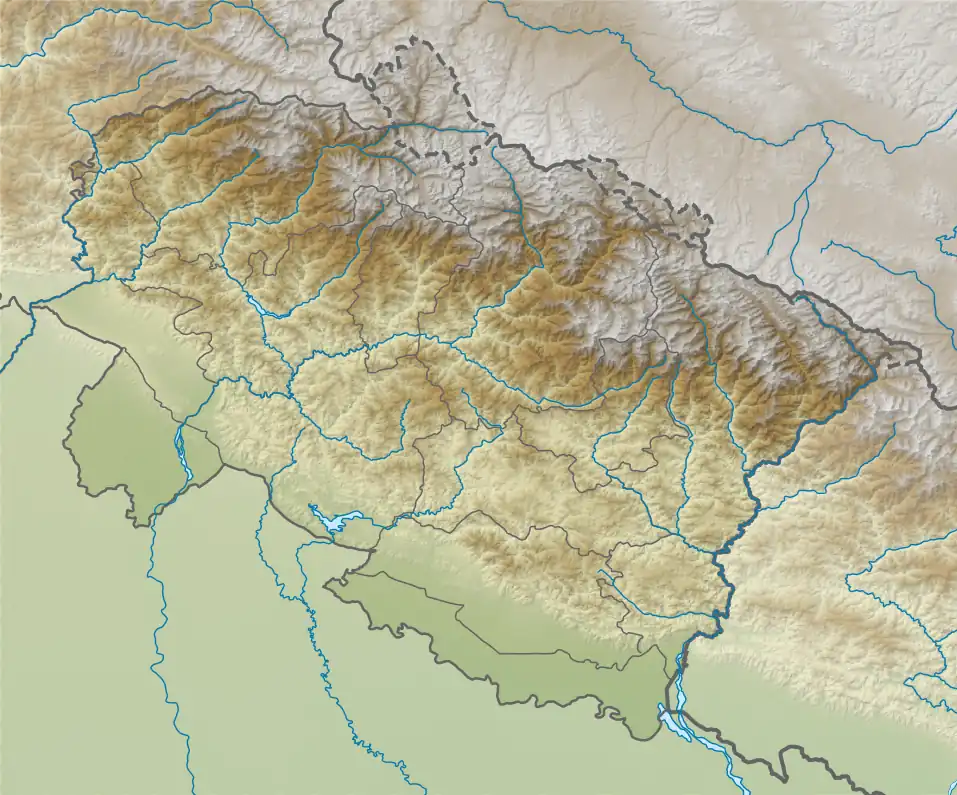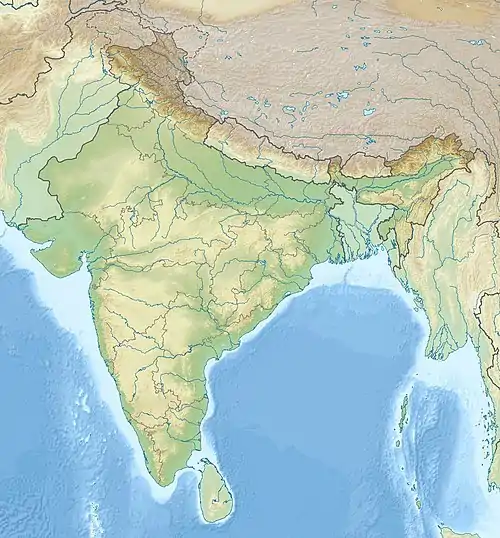| Ramganga Dam | |
|---|---|
 Ramganga Dam | |
 Location of Ramganga Dam in Uttarakhand  Ramganga Dam (India) | |
| Country | India |
| Location | Kalagarh |
| Coordinates | 29°31′10″N 78°45′31″E / 29.51944°N 78.75861°E |
| Status | Operational |
| Construction began | 1961 |
| Opening date | 1974 |
| Construction cost | Rs. 172.12 crores |
| Owner(s) | Uttaranchal Jal Vidyut Nigam Limited |
| Dam and spillways | |
| Type of dam | Embankment |
| Impounds | Ramganga River |
| Height | 128 m (420 ft) |
| Length | 630 m (2,067 ft) |
| Dam volume | 10,000,000 m3 (13,079,506 cu yd) |
| Spillway capacity | 8,467 m3/s (299,009 cu ft/s) |
| Reservoir | |
| Total capacity | 244,960,000 m3 (198,592 acre⋅ft) (8.65 tmc ft) |
| Active capacity | 219,600,000 m3 (178,033 acre⋅ft) (7.76 tmc ft) |
| Catchment area | 3,134 km2 (1,210 sq mi) |
| Surface area | 78.31 km2 (30 sq mi) |
| Power Station | |
| Decommission date | 1975-1977 |
| Hydraulic head | 84.4 m (277 ft) (design) |
| Turbines | 3 x 66 MW Francis-type |
| Installed capacity | 198 MW |
The Ramganga Dam, also known as the Kalagarh Dam, is an embankment dam on the Ramganga River 3 km (2 mi) upstream of Kalagarh in Pauri Garhwal district, Uttarakhand, India. It is located within the Jim Corbett National Park.
Background
The dam is part of the Ramganga Multipurpose Project — an irrigation and hydroelectric project. It supports a 198 MW power station and provides water for the irrigation of 57,500 ha (142,086 acres) of farmland. In addition, it provides for flood control and recreation. Construction on the dam began in 1961 and it was completed in 1974. The three generators in the power station were commissioned in December 1975, November 1976 and March 1977.[1]
Design
The dam is a 128 m (420 ft) tall and 630 m (2,067 ft) long earth and rock-fill embankment dam with 10,000,000 m3 (13,079,506 cu yd) of fill. The dam's spillway is controlled by five gates and has a maximum discharge of 8,467 m3/s (299,009 cu ft/s). To support the reservoir's elevation, there is a 72 m (236 ft) tall saddle dam on the reservoir's rim 2.5 km (2 mi) to the northeast on the Chui Sot River. The reservoir created by both dams has a 244,700,000 m3 (198,382 acre⋅ft) capacity of which 219,000,000 m3 (177,546 acre⋅ft) is active (or "useful") capacity. The reservoir has a surface of 78.31 km2 (30 sq mi) and a catchment area of 3,134 km2 (1,210 sq mi).[2][3] The power station at the toe of the dam contains three 66 MW Francis turbine-generators and is afforded 84.4 m (277 ft) of design hydraulic head.[4] Below the dam is a system of over 6,300 km (3,915 mi) of canals supported by three barrages and 82 km (51 mi) of main feeder canal.[1]
See also
References
- 1 2 Prasad, Kamta; Goel, R.S. (2000). Environmental management in hydro electric projects proceedings of the national seminar held at India International Centre, New Delhi, on November 11 and 12, 1999. New Delhi: Concept Pub. Co. p. 155. ISBN 81-7022-870-0.
- ↑ Jain, Sharad K.; Agarwal, Pushpendra K.; Singh, Vijay P. (2007). Hydrology and water resources of India. Dordrecht: Springer. pp. 382–383. ISBN 978-1-4020-5179-1.
- ↑ "India: National Register of Large Dams 2009" (PDF). Central Water Commission. Archived from the original (PDF) on 21 July 2011. Retrieved 10 July 2011.
- ↑ "Ramganga Power Plant (3X66 =198 MW)". Uttaranchal Jal Vidyut Nigam Limited. Retrieved 11 July 2011.